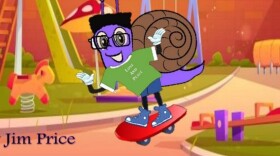“Make Your Own Money” is book for young people about making and spending money.
While it’s essentially a light-hearted how-to guide, the main character is based on author Ty Allan Jackson’s fictional character, Danny Dollar. In Jackson’s previous book, “Danny Dollar Millionaire Extraordinaire,” Danny aims to get rich by setting up a lemonade stand.
Although Jackson, of Pittsfield, Massachusetts, refers to Danny Dollar as his alter ego, he admits to some key differences in their life stories.
"I grew up in the Bronx,” Jackson said. “You don’t do lemonade stands in the Bronx. That’s just not how it works.”
But Jackson has nevertheless become an entrepreneur in adulthood, self-publishing most of his books, which he said have sold more than 150,000 copies in total. (His current book is published by Storey Publishing.)
Here is an excerpt from “Make Your Own Money: How Kids Can Earn It, Save It, Spend It, and Dream Big,” narrated by Danny Dollar:
When I was getting started on my dream of becoming the greatest lemonade stand entrepreneur in the world, or at least on my street, I have to admit, I doubted myself.
Then I thought about some of my heroes: Steve Jobs, who created Apple. Oprah Winfrey, who may be the most important person in entertainment. And Barack Obama, the first Black president. And I had to remind myself that they were all kids once too, and I bet they had dreams of being great. Just like I do. Just like you do.
Karen Brown, NEPM: Can you give us just a little history of Danny Dollar? He's your main character from at least one previous book.
Ty Allan Jackson, author: So Danny was born and conceived initially from a question from my son when he was 8 years old. He asked if he could open up a lemonade stand. And he made $50 in three hours selling lemonade, which kind of blew my mind. And he said, "Dad, what am I going to do with all this money?"
And honestly, I didn't know. So I went to my local bookstore to try to find a book to teach my son about money. And I couldn't find one. And right there, I thought, maybe I could write one.
I found a really endearing part of the book just how direct it was about money. And I was thinking, is there a sense that we have in our society that that's unseemly? That adults should talk about loftier goals with kids, like world peace? But maybe that doesn't really serve kids who actually have to live in the real world with real things like finances and their own economics.
Yeah, it's kind of hard to save the world if you're broke.
The more that we can learn about money and use it as a tool to better our lives and the lives of the people around us, I think the more we're capable of doing it. It's probably the greatest resource we [have] to make a difference. It's just easier to save the world more if you have money than if you don't.
So Danny Dollar is a kid of color. He's Black. And most of the pictures are of people of color. Is there a particular importance of teaching kids of color about money that perhaps is lacking out there?
It was important for me for Danny's world to be diverse because we live in a diverse world. Danny Dollar is a kid like any other kid. I could replace this character with an Asian girl and not have to do anything but change the pronouns.
And that matters to me because I don't want the heaviness and the stigma that so many authors of color put on children to read about, you know, historical, racial and social content. Kids just want to be kids, you know? And so it was important for this character to be broad, to be jovial and fun-loving and relatable.
At the same time, there is a shortage of representation of kids of color, of Black kids, of Hispanic kids, in literature and perhaps particularly around issues of money. I would think, without having to be direct about it, it serves that purpose.
Oh, for sure. And I'm proud of that. I'm proud of the fact that — first of all, there's so few books about money, period. And then for this particular book, happening to be a person of color, I think it brings an amazing dimension of where we are as a society, where it's normal ... to see a kid who maybe 20, 30, 40 years ago you might not see on a bookshelf somewhere teaching about money.
How would you describe the how-to climate for kids at the moment? Generally, what are those books like and what should people understand about it?
We have to do a better job of talking up to our kids. And realize that they are really just clean sheets and sponges ready to just receive whatever information you give them.
And whether it's learning how to play piano or financial literacy or something that challenges them, they are up to the task. And we need to do a better job of respecting their intellect and speaking up to them because they really are our future. And the more that we empower them to make the world a better place, the more they are going to be able to do so.





